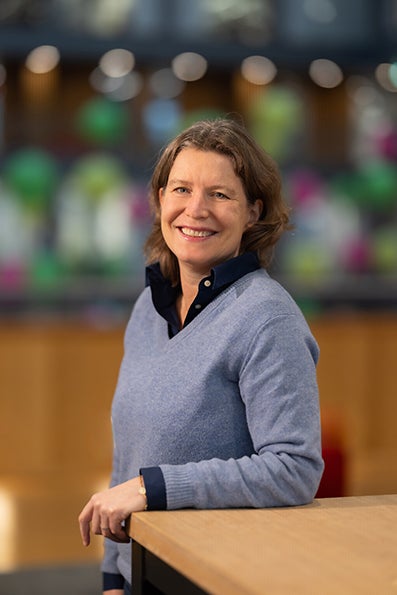This requires consciously composing teams and leveraging everyone's unique strengths. When done effectively, the quality of work improves, and VU Amsterdam can continue to excel.
A growing focus on education
My focus on education has developed and grown over the years. I have a natural interest in organising and ensuring smooth processes. After completing my PhD, I started working as an education coordinator alongside my research. In this role, I was involved in planning, internship coordination, and academic advising, as well as the content and coherence of education and assessment. At the same time, I gained firsthand experience of teaching practice as a lecturer.
Careful and thoughtful approach
In time, I joined VU Amsterdam, where I became chair of the Examination Board for Pedagogical and Educational Sciences. Here, I discovered how crucial proper assessment is, alongside clear learning objectives and effective teaching methods, and the significant impact these have on students' learning processes. I also gained insight into the vital role that lecturers play as mentors in this process. These are crucial aspects that require a careful and thoughtful approach.
Basic qualification and educational leadership
I am glad that I obtained my Basic Teaching Qualification (BKO) early on. This provided a solid foundation for understanding the principles of quality education. It is essential because many university lecturers do not receive training in teaching during their academic careers, despite it being a key part of their work. Later, I completed my Senior Teaching Qualification (SKO) with great enthusiasm and took part in the Educational Leadership Programme (LOL).
Making the most of strengths
The knowledge and skills I acquired through the SKO and LOL proved invaluable in my role as programme director for the Pedagogical and Educational Sciences bachelor’s degree. In this role, I was responsible for the quality of the entire bachelor's programme. This involved not only defining objectives, structures, coherence, and assessment but also forming teams where the right people were in the right positions. My aim was always to align teaching staff's strengths with their roles to optimise their potential.
Education strategy and agenda
As Vice Dean of Education, I now focus on the strategic level within our faculty. This role has been the most challenging and inspiring position I have held so far. Together with colleagues who have deep expertise in education, we shape the strategy for the coming years. As chair of the Educational Portfolio Holders’ Consultation (OPO), I also work on coordinating efforts between vice deans of education from different faculties. In this role, we oversee the implementation of the education agenda of VU Amsterdam and provide both solicited and unsolicited advice to the Executive Board.
Interplay between research and education
Although my primary focus is on education, I remain active in research. I supervise several PhD students and conduct research on topics such as self-regulation and identity development in adolescents and young adults. The transition from secondary to higher education presents key challenges and opportunities. The insights we gain from this research can be directly applied to our own educational practices. A concrete example is the development of VU Amsterdam’s new study choice check for prospective students, a project I led with great satisfaction. This initiative helps us better support students in their transition to university, laying a solid foundation for their success. Additionally, through the national Wisselstroom project of the Ministry of Education, Culture and Science, I contribute to improving the connection between secondary and higher education and enhancing students’ academic success.
Creating space for talent
Throughout my career, I have always sought roles where I could apply my passion and skills while contributing to the bigger picture. I believe that when everyone can use their unique talents, a team becomes stronger and more complete. This is also at the heart of the Recognition & Rewards programme. It creates space to prioritise individual strengths, aspirations, and needs while collectively working towards the greater whole.
